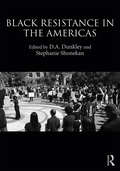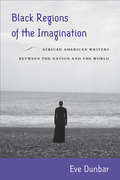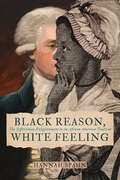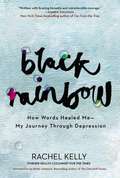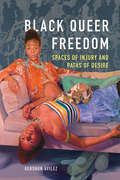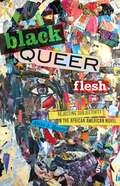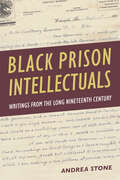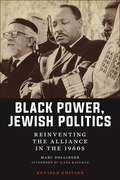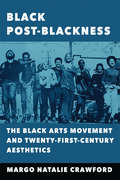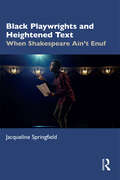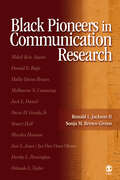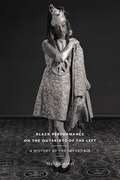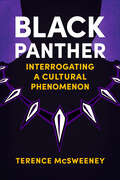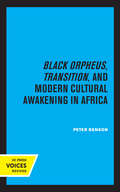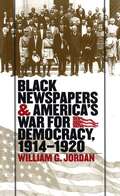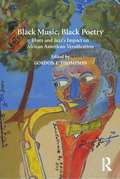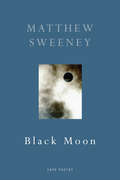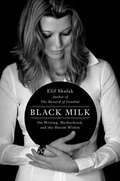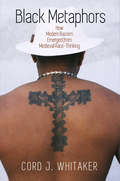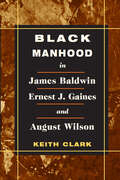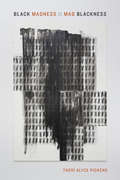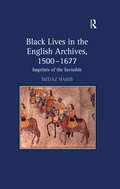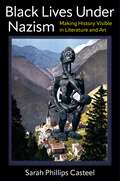- Table View
- List View
Black Resistance in the Americas
by Stephanie Shonekan D. A. DunkleyAll across the US in the last few years, there has been a resurgence of Black protest against structural racism and other forms of racial injustice. Black Resistance in the Americas draws attention to this renewed energy and how this theme of resistance intersects with other communities of Black people around the world. This edited collection examines in depth stories of resistance against slavery, narratives of resistance in African American, Afro-Caribbean, and Afro-Latin American Literature, resistance in politics, education, religion, music, dance, and film, exploring a range of new perspectives from established and emerging researchers on Black communities. The essays in this pivotal book discuss some of the mechanisms that Black communities have used to resist bondage, domination, disempowerment, inequality, and injustices resulting from their encounters with the West, from colonization to forced migration.
Black Regions of the Imagination: African American Writers between the Nation and the World
by Eve DunbarZora Neale Hurston, Richard Wright, James Baldwin, and Chester Himes were all pressured by critics and publishers to enlighten mainstream (white) audiences about race and African American culture. Focusing on fiction and non-fiction they produced between the Harlem Renaissance and the Black Arts Movement, Eve Dunbar’s important book, Black Regions of the Imagination, examines how these African American writers—who lived and traveled outside the United States—both document and re-imagine their “homegrown” racial experiences within a worldly framework. From Hurston’s participant-observational accounts and Wright’s travel writing to Baldwin’s Another Country and Himes’ detective fiction, these writers helped develop the concept of a “region” of blackness that resists boundaries of genre and geography. Each writer represents—and signifies—blackness in new ways and within the larger context of the world. As they negotiated issues of “belonging,” these writers were more critical of social segregation in America as well as increasingly resistant to their expected roles as cultural “translators.”
Black Reason, White Feeling: The Jeffersonian Enlightenment in the African American Tradition (Jeffersonian America)
by Hannah SpahnThe vital influence of Black American intellectuals on the legacy of Thomas Jefferson&’s ideas The lofty Enlightenment principles articulated by Thomas Jefferson in the Declaration of Independence, so central to conceptions of the American founding, did not emerge fully formed as a coherent set of ideas in the eighteenth century. As Hannah Spahn argues in this important book, no group had a more profound influence on their development and reception than Black intellectuals. The rationalism and universalism most associated with Jefferson today, she shows, actually sprang from critical engagements with his thought by writers such as David Walker, Lemuel Haynes, Frederick Douglass, and W. E. B. Du Bois.Black Reason, White Feeling illuminates the philosophical innovations that these and other Black intellectuals made to build on Jefferson&’s thought, shaping both Jefferson&’s historical image and the exalted legacy of his ideas in American culture. It is not just the first book-length history of Jefferson&’s philosophy in Black thought; it is also the first history of the American Enlightenment that centers the originality and decisive impact of the Black tradition.
Black Rainbow: How Words Healed Me, My Journey Through Depression
by Rachel KellyIn 1997, Oxford graduate, working mother and Times journalist Rachel Kelly went from feeling mildly anxious to being completely unable to function within the space of just three days. Prescribed antidepressants by her doctor, and supported by her husband and her family, Rachel slowly began to get better, but her anxiety levels remained high, and six years later, as a stay-at-home mother, she suffered a second collapse even worse than the first. Throughout both of Rachel's periods of severe depression, the healing power of poetry became an integral part of her recovery. As someone who had always loved poetry, it became something for Rachel to cling on to in times of need - from repeating short mantras to learning and reciting entire poems - these words and verses became a powerful force for change in her life. In Black Rainbow Rachel analyses why poetry can be one answer to depression, and the book contains a selected 40 of the poems that provided Rachel with solace and comfort during her breakdown and recovery. At a time when mental health problems and depression are becoming more common, and the stigma around such issues is finally being lifted, this book offers a lifeline for anyone seeking to understand depression and seek new ways to treat it. Poetry is free, has no side-effects and, as Rachel can attest, 'prescribing words instead of pills' can be an incredibly powerful remedy.
Black Queer Freedom: Spaces of Injury and Paths of Desire (New Black Studies)
by GerShun AvilezWhether engaged in same-sex desire or gender nonconformity, black queer individuals live with being perceived as a threat while simultaneously being subjected to the threat of physical, psychological, and socioeconomical injury. Attending to and challenging threats has become a defining element in queer black artists’ work throughout the black diaspora. GerShun Avilez analyzes the work of diasporic artists who, denied government protections, have used art to create spaces for justice. He first focuses on how the state seeks to inhibit the movement of black queer bodies through public spaces, whether on the street or across borders. From there, he pivots to institutional spaces—specifically prisons and hospitals—and the ways such places seek to expose queer bodies in order to control them. Throughout, he reveals how desire and art open routes to black queer freedom when policy, the law, racism, and homophobia threaten physical safety, civil rights, and social mobility.
Black Queer Flesh: Rejecting Subjectivity in the African American Novel
by Alvin J. HenryA groundbreaking examination of how twentieth-century African American writers use queer characters to challenge and ultimately reject subjectivity Black Queer Flesh reinterprets key African American novels from the Harlem Renaissance to Black Modernism to contemporary literature, showing how authors have imagined a new model of black queer selfhood. African American authors blame liberal humanism&’s model of subjectivity for double consciousness and find that liberal humanism&’s celebration of individual autonomy and agency is a way of disciplining Black queer lives. These authors thus reject subjectivity in search of a new mode of the self that Alvin J. Henry names &“black queer flesh&”—a model of selfhood that is collective, plural, fluctuating, and deeply connected to the black queer past. Henry begins with early twentieth-century authors such as Jessie Redmon Fauset and James Weldon Johnson. These authors adapted the Bildungsroman, the novel of self-formation, to show African Americans gaining freedom and agency by becoming a liberal, autonomous subjects. These authors, however, discovered that the promise of liberal autonomy held out by the Bildungsroman was yet another tool of antiblack racism. As a result, they tentatively experimented with repurposing the Bildungsroman to throw off subjectivity and its attendant double consciousness. In contrast, Nella Larsen, Henry shows, was the first author to fully reject subjectivity. In Quicksand and Passing, Larsen invented a new genre showing her queer characters—characters whose queerness already positioned them on the margins of subjectivity—escaping subjectivity altogether. Using Ralph Ellison&’s archival drafts, Henry then powerfully rereads Invisible Man, revealing that the protagonist as a queer, disabled character taught by the novel&’s many other queer, disabled characters to likewise seek a selfhood beyond subjectivity. Although Larsen and Ellison sketch glimpses of this selfhood beyond subjectivity, only Saidiya Hartman&’s Wayward Lives, Beautiful Experiments shows a protagonist fully inhabiting black queer flesh—a new mode of selfhood that is collective, plural, always evolving, and no longer alienated from the black past.Black Queer Flesh is an original and necessary contribution to black literary studies, offering new ways to understand and appreciate the canonical texts and far more.
Black Pulp: Genre Fiction in the Shadow of Jim Crow
by Brooks E. HefnerA deep dive into mid-century African American newspapers, exploring how Black pulp fiction reassembled genre formulas in the service of racial justice In recent years, Jordan Peele&’s Get Out, Marvel&’s Black Panther, and HBO&’s Watchmen have been lauded for the innovative ways they repurpose genre conventions to criticize white supremacy, celebrate Black resistance, and imagine a more racially just world—important progressive messages widely spread precisely because they are packaged in popular genres. But it turns out, such generic retooling for antiracist purposes is nothing new. As Brooks E. Hefner&’s Black Pulp shows, this tradition of antiracist genre revision begins even earlier than recent studies of Black superhero comics of the 1960s have revealed. Hefner traces it back to a phenomenon that began in the 1920s, to serialized (and sometimes syndicated) genre stories written by Black authors in Black newspapers with large circulations among middle- and working-class Black readers. From the pages of the Pittsburgh Courier and the Baltimore Afro-American, Hefner recovers a rich archive of African American genre fiction from the 1920s through the mid-1950s—spanning everything from romance, hero-adventure, and crime stories to westerns and science fiction. Reading these stories, Hefner explores how their authors deployed, critiqued, and reassembled genre formulas—and the pleasures they offer to readers—in the service of racial justice: to criticize Jim Crow segregation, racial capitalism, and the sexual exploitation of Black women; to imagine successful interracial romance and collective sociopolitical progress; and to cheer Black agency, even retributive violence in the face of white supremacy. These popular stories differ significantly from contemporaneous, now-canonized African American protest novels that tend to represent Jim Crow America as a deterministic machine and its Black inhabitants as doomed victims. Widely consumed but since forgotten, these genre stories—and Hefner&’s incisive analysis of them—offer a more vibrant understanding of African American literary history.
Black Prison Intellectuals: Writings from the Long Nineteenth Century
by Andrea StoneHow early Black prison writing shaped Black intellectual movements In this book, Andrea Stone recovers critical, understudied writings from early archives to call into question the idea that the Black prison intellectual movement began in the twentieth century. In fact, nearly two centuries before Angela Davis and Eldridge Cleaver, Black prisoners were serving as thought leaders and contributing to political movements. By illuminating their pathbreaking voices, Stone shows that prison writing from this era was a foundational part of Black American intellectualism. Grounding her work in a history of the disproportionately high incarceration of Black Americans, Stone traces the arc of Black prison writing from 1795 to 1901. She analyzes gallows literature, court records, newspaper coverage, and parole request letters, arguing that parole requests represent an undervalued, vital literary genre. Most of the writers featured in this book were effectively treated as enemies of the state, leading Stone to a question that continues to resonate in America today: what is the distinction between criminal and enemy, and how are those categories intertwined with Blackness in the United States? Black Prison Intellectuals sheds light on the roots of issues like structural racism and mass incarceration. Looking at an important literary tradition that contributed to the Black American intellectual movement, this book helps readers better understand the present as a moment in the long journey toward a racially just society. Publication of this work made possible by a Sustaining the Humanities through the American Rescue Plan grant from the National Endowment for the Humanities.
Black Power, Jewish Politics: Reinventing the Alliance in the 1960s, Revised Edition (Goldstein-Goren Series in American Jewish History)
by Marc DollingerHighlights Jewish participation in the civil rights movementBlack Power, Jewish Politics charts the transformation of American Jewish political culture from the Cold War liberal consensus of the early postwar years to the rise and influence of Black Power-inspired ethnic nationalism. It shows how, in a period best known for the rise of antisemitism in some parts of the Black community and the breakdown of the alliance between white Jews and Black Americans, Black Power activists enabled Jewish activists to devise a new Judeo-centered political agenda—including the emancipation of Soviet Jews, the rise of Jewish Day Schools, the revitalization of worship services with gender-inclusive liturgy, and the birth of a new form of American Zionism.Undermining widely held beliefs about the civil rights movement, Black Power, racism, Soviet Jewry, American Zionism, and the religious revival of the 1970s, Black Power, Jewish Politics describes a new political consensus based on identity politics that drew Black and Jewish Americans together and altered the course of American liberalism.In the midst of national reckoning on race, this revised edition extends the book’s thesis to the contemporary period, investigating the limits of white Jewish liberalism, the ways in which scholars have and have not addressed racial privilege in their work, and the dynamics around these themes in a much more diverse American Jewish community.
Black Post-Blackness: The Black Arts Movement and Twenty-First-Century Aesthetics
by Margo Natalie CrawfordA 2008 cover of The New Yorker featured a much-discussed Black Power parody of Michelle and Barack Obama. The image put a spotlight on how easy it is to flatten the Black Power movement as we imagine new types of blackness. Margo Natalie Crawford argues that we have misread the Black Arts Movement's call for blackness. We have failed to see the movement's anticipation of the "new black" and "post-black." Black Post-Blackness compares the black avant-garde of the 1960s and 1970s Black Arts Movement with the most innovative spins of twenty-first century black aesthetics. Crawford zooms in on the 1970s second wave of the Black Arts Movement and shows the connections between this final wave of the Black Arts movement and the early years of twenty-first century black aesthetics. She uncovers the circle of black post-blackness that pivots on the power of anticipation, abstraction, mixed media, the global South, satire, public interiority, and the fantastic.
Black Playwrights and Heightened Text: When Shakespeare Ain’t Enuf
by Jacqueline SpringfieldBlack Playwrights and Heightened Text: When Shakespeare Ain’t Enuf breaks down the misconception that heightened text sits only within a white tradition and brings the work of Black playwrights from across history to the forefront by highlighting the use of heightened dramatic text in their work.Interrogating the use of linguistic techniques often seen in heightened text, such as: enjambment, assonance, and consonance, author Jacqueline Springfield looks at the ways in which these techniques allow the text itself to have a kind of permanence in audiences’ minds and works to reinforce a character’s objective within the play. The book presents examples of works from a plethora of Black playwrights, including Langston Hughes, Lorraine Hansberry, Amiri Baraka, August Wilson, Katori Hall, Marcus Gardley, Tarell Alvin McCraney, and many more, as well as providing the context in which they’re writing. Theatre artists who read, teach, direct and perform the work of Black playwrights answer key questions in their own words in interviews with the author. Interviewees include Dominique Morisseau, Ron OJ Parson, Mfoniso Udofia, Zora Howard and many other theatre practitioners. Taking a chronological approach, the book examines the history of heightened text in the works of Black playwrights and re-defines the ways in which theatre students and scholars can understand the techniques of heightened texts outside of a purely Eurocentric and white perspective.Ideal for students of theatre history, acting, playwriting, and text analysis, as well as researchers of African American theatre.
Black Pioneers in Communication Research
by Ronald L. Jackson Sonja M. Brown Givens"Black Pioneers in Communication Research is a pathbreaking book that displays a refreshingly joyful and critical spirit. Here, communication theory is shown to be the work of real persons living real lives, asking real questions of real problems. By celebrating and evaluating the lives of Black scholars as they have sought to advance communication studies, readers are introduced to perhaps the first truly foundational text our field has to offer! By tracing pioneers′ life histories up to their current contributions to the field of communication, students will not simply be exposed to a concept and its definition, but rather invited to explore the evolution of both the concept and its progenitor. This illuminates and enlivens the study of communication while helping readers to be conscious of the conditions that have helped to shape our current state of knowledge. Black Pioneers in Communication Research is fully edifying: It lifts all communication scholars higher by being courageous enough to teach us as intellectuals that when we lay bare some of the intricacies of our lives, our students are better able to understand the complex canvases upon which our paradigms are built." --Eric King Watts, Wake Forest UniversityBlack Pioneers in Communication Research is the only book in the field of communication that—through personal interviews—systematically explores the lives, careers, and profound conceptual contributions of the men and women who have helped shape the contours of humanistic and social scientific inquiry within communication studies and beyond. The personal lives and careers of eleven leading scholars are profiled: Molefi Kete Asante, Donald E. Bogle, Hallie Quinn Brown, Melbourne S. Cummings, Jack L. Daniel, Oscar H. Gandy, Jr., Stuart Hall, Marsha Houston, Joni L. Jones/Iya Omi Osun Olomo, Dorthy L. Pennington, and Orlando L. Taylor. These pioneers have had an indelible impact on Black Studies, sociology, communication, political science, film studies, rhetoric, sociolinguistics, and cultural studies. Black Pioneers in Communication Research presents a penetrating look into the circumstances that shifted the paradigms of interdisciplinary thought. Some of the concepts covered in this book are afrocentricity, articulation theory, aphasia, oral performance and interpretation, womanism, Black English, Black oral traditions, the TrEE communication development model, chronemics, as well as the mammy, buck, mulatto, coon, and Uncle Tom images in film and television. Intended Audience:This is an excellent textbook for advanced undergraduate and graduate courses dealing with African American communication and/or communication research (such as intercultural communication, African American communication, African American studies, African American rhetoric, communication research, and communication theory~
Black Performance on the Outskirts of the Left: A History of the Impossible (Sexual Cultures #49)
by Malik GainesArticulates the role black theatricality played in the radical energy of the sixties Black Performance on the Outskirts of the Left illustrates the black political ideas that radicalized the artistic endeavors of musicians, playwrights, and actors beginning in the 1960s. These ideas paved the way for imaginative models for social transformation through performance. Using the notion of excess—its transgression, multiplicity, and ambivalence—Malik Gaines considers how performances of that era circulated a black political discourse capable of unsettling commonplace understandings of race, gender, and sexuality. Following the transnational route forged by W.E.B. Du Bois, Josephine Baker, and other modern political actors, from the United States to West Africa, Europe and back, this book considers how artists negotiated at once the local, national, and diasporic frames through which race has been represented. Looking broadly at performances found in music, theater, film, and everyday life—from American singer and pianist Nina Simone, Ghanaian playwrights Efua Sutherland and Ama Ata Aidoo, Afro-German actor Günther Kaufmann, to California-based performer Sylvester—Gaines explores how shared signs of racial legacy and resistance politics are articulated with regional distinction. Bringing the lens forward through contemporary art performance at the 2015 Venice Biennial, Gaines connects the idea of sixties radicality to today’s interest in that history, explores the aspects of those politics that are lost in translation, and highlights the black expressive strategies that have maintained potent energy. Black Performance on the Outskirts of the Left articulates the role black theatricality played in the radical energy of the sixties, following the evolution of black identity politics to reveal blackness’s ability to transform contemporary social conditions.
Black Panther: Interrogating a Cultural Phenomenon (Reframing Hollywood)
by Terence McSweeneyNamed a Nonfiction Book Awards Gold Winner by the Nonfiction Authors AssociationGold Winner of the 2022 eLit Book Award for Popular CultureWinner of a National Indie Excellence Award in the category of “Movies & TV”Book of the Year 2021 in African Studies awarded by CESTAFWinner of the 2022 Best Book Award in the category of “Performing Arts”Black Panther is one of the most financially successful and culturally impactful films to emerge from the American film industry in recent years. When it was released in 2018 it broke numerous records and resonated with audiences all around the world in ways that transcended the dimensions of the superhero film. In Black Panther: Interrogating a Cultural Phenomenon, author Terence McSweeney explores the film from a diverse range of perspectives, seeing it as not only a comic book adaptation and a superhero film, but also a dynamic contribution to the discourse of both African and African American studies. McSweeney argues that Black Panther is one of the defining American films of the last decade and the most remarkable title in the Marvel Cinematic Universe (2008–). The MCU has become the largest film franchise in the history of the medium and has even shaped the contours of the contemporary blockbuster, but the narratives within it have almost exclusively perpetuated largely unambiguous fantasies of American heroism and exceptionalism. In contrast, Black Panther complicates this by engaging in an entirely different mythos in its portrayal of an African nation—never colonized by Europe—as the most powerful and technologically advanced in the world. McSweeney charts how and why Black Panther became a cultural phenomenon and also a battleground on which a war of meaning was waged at a very particular time in American history.
Black Orpheus, Transition, and Modern Cultural Awakening in Africa
by Peter BensonThis title is part of UC Press's Voices Revived program, which commemorates University of California Press’s mission to seek out and cultivate the brightest minds and give them voice, reach, and impact. Drawing on a backlist dating to 1893, Voices Revived makes high-quality, peer-reviewed scholarship accessible once again using print-on-demand technology. This title was originally published in 1986.
Black Newspapers and America's War for Democracy, 1914-1920
by William G. JordanDuring World War I, the publishers of America's crusading black newspapers faced a difficult dilemma. Would it be better to advance the interests of African Americans by affirming their patriotism and offering support of President Wilson's war for democracy in Europe, or should they demand that the government take concrete steps to stop the lynching, segregation, and disfranchisement of blacks at home as a condition of their participation in the war?This study of their efforts to resolve that dilemma offers important insights into the nature of black protest, race relations, and the role of the press in a republican system. William Jordan shows that before, during, and after the war, the black press engaged in a delicate and dangerous dance with the federal government and white America--at times making demands or holding firm, sometimes pledging loyalty, occasionally giving in.But although others have argued that the black press compromised too much, Jordan demonstrates that, given the circumstances, its strategic combination of protest and accommodation was remarkably effective. While resisting persistent threats of censorship, the black press consistently worked at educating America about the need for racial justice.
Black Music, Black Poetry: Blues and Jazz's Impact on African American Versification
by Gordon E. ThompsonBlack Music, Black Poetry offers readers a fuller appreciation of the diversity of approaches to reading black American poetry. It does so by linking a diverse body of poetry to musical genres that range from the spirituals to contemporary jazz. The poetry of familiar figures such as Paul Laurence Dunbar and Langston Hughes and less well-known poets like Harryette Mullen or the lyricist to Pharaoh Sanders, Amos Leon Thomas, is scrutinized in relation to a musical tradition contemporaneous with the lifetime of each poet. Black music is considered the strongest representation of black American communal consciousness; and black poetry, by drawing upon such a musical legacy, lays claim to a powerful and enduring black aesthetic. The contributors to this volume take on issues of black cultural authenticity, of musical imitation, and of poetic performance as displayed in the work of Paul Laurence Dunbar, Langston Hughes, Sterling Brown, Amiri Baraka, Michael Harper, Nathaniel Mackey, Jayne Cortez, Harryette Mullen, and Amos Leon Thomas. Taken together, these essays offer a rich examination of the breath of black poetry and the ties it has to the rhythms and forms of black music and the influence of black music on black poetic practice.
Black Moon
by Matthew SweeneyNegotiating the borders and hinterlands of Central and Eastern Europe - with occasional coracle trips or forays to Antarctica for a round of golf - the homesick flaneur surveys the surrounding devastation with the same mixture of fascination and alarm he feels when he discovers the sweat-mark on his T-shirt makes a perfect map of Ireland. All around, he sees natural and man-made catastrophe: the ruins and remnants of war peopled by kidnappers and assassins, feral dogs, death squads, the dispossessed and deracinated. These poems are parables of threat, parties for the end of the world; they speak eloquently of damage, displacement and the resulting swell of terror: 'I looked back at the door heard the lock click, then beyondanother lock, then another.'
Black Milk
by Elif ShafakBlack Milk is the affecting and beautifully written memoir on motherhood and writing by Turkey's bestselling female writer Elif Shafak, author of Honour, The Gaze and The Bastard of Istanbul which was long-listed for the Orange prize. Postpartum depression affects millions of new mothers every year, and- like most of its victims- Elif Shafak never expected to be one of them. But after the birth of her first child in 2006, the internationally bestselling Turkish author remembers how "for the first time my adult life . . . words wouldn't speak to me". As her despair finally eased, Shafak sought to resuscitate her writing life by chronicling her own experiences. In her intimate memoir, she reveals how she struggled to overcome her depression and how literature provided the salvation she so desperately needed. 'An intimate, affecting memoir . . . Her passion for literature is contagious, and her struggle with postpartum depression and writer's block reinforces how carefully all of us must tread. Beautifully rendered, Shafak's Black Milk is an epic poem to women everywhere' Colleen Mondor Elif Shafak is the acclaimed author of The Bastard of Istanbul and The Forty Rules of Love and is the most widely read female novelist in Turkey. Her work has been translated into more than thirty languages. She is a contributor for The Telegraph, Guardian and the New York Times and her TED talk on the politics of fiction has received 500 000 viewers since July 2010. She is married with two children and divides her time between Istanbul and London.
Black Metaphors: How Modern Racism Emerged from Medieval Race-Thinking (The Middle Ages Series)
by Cord J. WhitakerIn the late Middle Ages, Christian conversion could wash a black person's skin white—or at least that is what happens when a black sultan converts to Christianity in the English romance King of Tars. In Black Metaphors, Cord J. Whitaker examines the rhetorical and theological moves through which blackness and whiteness became metaphors for sin and purity in the English and European Middle Ages—metaphors that guided the development of notions of race in the centuries that followed. From a modern perspective, moments like the sultan's transformation present blackness and whiteness as opposites in which each condition is forever marked as a negative or positive attribute; medieval readers were instead encouraged to remember that things that are ostensibly and strikingly different are not so separate after all, but mutually construct one another. Indeed, Whitaker observes, for medieval scholars and writers, blackness and whiteness, and the sin and salvation they represent, were held in tension, forming a unified whole.Whitaker asks not so much whether race mattered to the Middle Ages as how the Middle Ages matters to the study of race in our fraught times. Looking to the treatment of color and difference in works of rhetoric such as John of Garland's Synonyma, as well as in a range of vernacular theological and imaginative texts, including Robert Manning's Handlyng Synne, and such lesser known romances as The Turke and Sir Gawain, he illuminates the process by which one interpretation among many became established as the truth, and demonstrates how modern movements—from Black Lives Matter to the alt-right—are animated by the medieval origins of the black-white divide.
Black Men Worshipping
by Stacy C. Boyd"Black Men Worshipping" analyzes the discursive spaces where black Christian masculinity is constructed, performed, and contested in American religion and culture. It judiciously considers the anxiety that emerges from black male negotiations with constructions of blackness, maleness, and Christian embodiment. "Black Men Worshipping" places fictive literary narratives such as "Uncle Tom's Cabin" and "In My Father's House," and film narratives such as "The Green Mile" in dialogue with the non-fictive narratives of popular African American figures Bishop T. D. Jakes and Pastor Donnie McClurkin in an effort to provide a snapshot of the complex constellation of issues involved in black male Christian embodiment.
Black Manhood in James Baldwin, Ernest J. Gaines, and August Wilson
by Keith ClarkFrom Frederick Douglass to the present, the preoccupation of black writers with manhood and masculinity is a constant. Black Manhood in James Baldwin, Ernest J. Gaines, and August Wilson explores how in their own work three major African American writers contest classic portrayals of black men in earlier literature, from slave narratives through the great novels of Richard Wright and Ralph Ellison. Keith Clark examines short stories, novels, and plays by Baldwin, Gaines, and Wilson, arguing that since the 1950s the three have interrupted and radically dismantled the constricting literary depictions of black men who equate selfhood with victimization, isolation, and patriarchy. Instead, they have reimagined black men whose identity is grounded in community, camaraderie, and intimacy. Delivering original and startling insights, this book will appeal to scholars and students of African American literature, gender studies, and narratology.
Black Madness: : Mad Blackness
by Therí Alyce PickensIn Black Madness :: Mad Blackness Therí Alyce Pickens rethinks the relationship between Blackness and disability, unsettling the common theorization that they are mutually constitutive. Pickens shows how Black speculative and science fiction authors such as Octavia Butler, Nalo Hopkinson, and Tananarive Due craft new worlds that reimagine the intersection of Blackness and madness. These creative writer-theorists formulate new parameters for thinking through Blackness and madness. Pickens considers Butler's Fledgling as an archive of Black madness that demonstrates how race and ability shape subjectivity while constructing the building blocks for antiracist and anti-ableist futures. She examines how Hopkinson's Midnight Robber theorizes mad Blackness and how Due's African Immortals series contests dominant definitions of the human. The theorizations of race and disability that emerge from these works, Pickens demonstrates, challenge the paradigms of subjectivity that white supremacy and ableism enforce, thereby pointing to the potential for new forms of radical politics.
Black Lives in the English Archives, 1500–1677: Imprints of the Invisible
by Imtiaz HabibContaining an urgently needed archival database of historical evidence, this volume includes both a consolidated presentation of the documentary records of black people in Tudor and Stuart England, and an interpretive narrative that confirms and significantly extends the insights of current theoretical excursus on race in early modern England. Here for the first time Imtiaz Habib collects the scattered references to black people-whether from Africa, India or America-in sixteenth- and seventeenth-century England, and arranges them into a systematic, chronological descriptive index. He offers an extended historical and theoretical interpretation of the records in six chapters, which serve as an introductory guide to the index even as they articulate a specific argument about the meaning of the records. Both the archival information and interpretive scholarship provide a strong framework from which future historical debates on race in early modern England can proceed.
Black Lives Under Nazism: Making History Visible in Literature and Art (Black Lives in the Diaspora: Past / Present / Future)
by Sarah Phillips CasteelIn a little-known chapter of World War II, Black people living in Nazi Germany and occupied Europe were subjected to ostracization, forced sterilization, and incarceration in internment and concentration camps. In the absence of public commemoration, African diaspora writers and artists have preserved the stories of these forgotten victims of the Third Reich. Their works illuminate the relationship between creative expression and wartime survival and the role of art in the formation of collective memory.This groundbreaking book explores a range of largely overlooked literary and artistic works that challenge the invisibility of Black wartime history. Emphasizing Black agency, Sarah Phillips Casteel examines both testimonial art by victims of the Nazi regime and creative works that imaginatively reconstruct the wartime period. Among these are the internment art of Caribbean painter Josef Nassy, the survivor memoir of Black German journalist Hans J. Massaquoi, the jazz fiction of African American novelist John A. Williams and Black Canadian novelist Esi Edugyan, and the photomontages of Scottish Ghanaian visual artist Maud Sulter. Bridging Black and Jewish studies, this book identifies the significance of African diaspora experiences and artistic expression for Holocaust history, memory, and representation.
